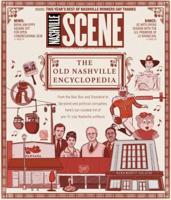Chick History is a local nonprofit that — and I'm quoting from the website — "provides help to advance the field of women’s history through professional development, consulting services, and community outreach. Chick History works with businesses, nonprofits, and cultural sites to raise awareness of women’s history."
Great. I'm all for more history, more inclusive history, and more people being excited about history. I like explicitly feminist things and trying to raise the profile of historic women is nicely feminist.
Chick History is having a fund-raiser at the Belle Meade plantation where you can pay $40 ($60, if you want to play dress-up) to look at pretty historic dresses while drinking wine (or lemonade) and learning about dress reform in the 19th century.
Join Chick History for a private event at one of Nashville’s most posh (historical) residences. Learn about the Dress Reform Movement, the evolution of fashion, and the changing waistline over time. During our private tours of the mansion, authentic period-piece dresses will be staged throughout the house. After our tours, we will be treated to a wine tasting (or lemonade tasting) and a Q&A with curators in our own private reception on the plantation grounds.VIP Experience: Ever wonder what it’s like to wear a corset?
Six lucky VIPs will actually be “dressed” in a full period-costume by the Belle Meade experts! These six VIP tickets are available on a first come/first-serve basis. If you want the VIP experience, buy your VIP ticket soon…they won’t last!
100% of the proceeds benefit Chick History, Inc., a Nashville non-profit dedicated to equality through women’s history.
Nothing says "promoting inclusive history" like hosting a fundraiser where women can dress up like slave owners.
Belle Meade's own website is pretty clear about what a hellhole the plantation was for the people enslaved and held captive there. John Harding traveled to Natchez to literally sell slaves down the river, which broke up families. People who could escape from Belle Meade did. People enslaved for household duty had to sleep in the Hardings' bedrooms. Belle Meade tries to claim that the wet nurses were "tending and nursing their master’s children along side their own," but no. If you were an enslaved woman forced to act as wet nurse in the house all the time with your captor's children, you didn't get to tend your own kids. You had to hope someone else would take mercy on them and keep them fed and looked after.
The wealth that the people the Hardings bought and sold generated for them did not get passed along to the descendants of those people. Again, quoting from Belle Meade's own website: "Descendants of the farm’s enslaved families lived in local cabins until the 1970’s, when the quarters were demolished by neighborhood construction."
Slavery did such a number on the people enslaved at Belle Meade that a hundred years after emancipation descendants of those slaves were still living in slave cabins, gazing out across the land their ancestors cleared, the house their ancestors built, the building of which was financed by the sales of said ancestors, the ostentatious flaunting of the wealth literally squeezed out of them — I mean, it's gross, but it's poetic. If you want to know how the Hardings could have those things, just gaze upon the sorry state of the people they stole and stole from to make it so who, even forty years ago, were right over there!
You want to complain about women being erased from history? Chick History is doing a fundraiser where you can pay more to be laced into a corset at a fancy Southern plantation while you learn about dress reform, as if dress reform was even on the radar of most of the women who lived at Belle Meade — the women who would have sewn the dresses and laced the corsets and spun the thread and weaved the fabric and mourned their children sold away so that more fashionable fabric could be brought into the house when the fabric they made was too plain.
Do those women not count? Do their tragedies really weigh less in the balance than the beautiful dresses their tragedies made possible?
What kind of message does it send when women, under the guise of raising money for the promotion of women's history, get together to ooh and ahh at the aesthetics of enslavers? Exactly whose history is Chick History?




